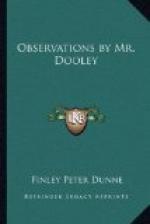“I believe ye’re no betther thin th’ rest iv thim thraitors,” said Mr. Hennessy.
“I’m diff’rent,” said Mr. Dooley, calmly. “They helped him in an’ I’d do annything in me power, now that he is king, to help him out.”
One Advantage of Poverty
“Well, sir,” said Mr. Dooley, “ye ought to be glad ye’re not sick an’ illusthrees at th’ same time.”
“How’s that?” Mr. Hennessy demanded.
“Well, ye see,” said Mr. Dooley, “suppose annything happens to ye now; a fellow counthryman dhrops a hammer on ye th’ day afther th’ picnic or ye’er di-gestion listens to a walkin’ dillygate fr’m th’ Union iv Microbes an’ goes out on sthrike. Th’ polisman on th’ corner has th’ usual suspicions among gintlemen an’ hits ye over th’ head an’ calls th’ wagon an’ sinds ye home. Th’ good woman wrings her hands an’ calls Hiven to witness that if ye have a toothache ye wake th’ neighborhood, an’ slaps a mustard plasther on ye. If she comes back later an’ finds ye haven’t put th’ sheet between ye an’ th’ plasther an’ gone to sleep, she knows ’tis seeryous an’ sinds f’r th’ doctor. We continyoo to have doctors in what th’ pa-apers calls th’ outlyin’ wards. They live above th’ dhrug-store an’ practice midicine on us. Th’ physicians an’ surgeons are all down town editin’ th’ pa-apers. Well, dock comes to ye afther awhile in a buggy. On th’ way up he sets a broken leg, removes an arm, does a little something f’r th’ city directhry, takes a dhrink, talks pollyticks with th’ unhappy parent an’ fin’lly lands at ye’er dure with th’ burglar’s tools. Afther he’s closed that dure th’ secrets iv th’ inner man is known on’y to him. No wan hears or wants to hear annything about it. Th’ nex’ time we see ye, ye come out lookin’ pale an’ emacyated an’ much younger an’ betther lookin’ thin annywan iver raymimbers seein’ ye, an’




